
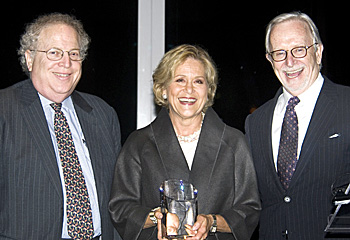
Dean Thomas F. Cooley (right) and William R. Berkley (left) honor Judith Rodin with the 2009 Charles Waldo Haskins Award at a celebratory dinner in April. |
NYU Stern Celebrates the Impact of Education at the Haskins Award Dinner
On April 28, nearly 220 NYU Stern alumni and friends gathered for the 2009 Haskins Award Dinner at the Mandarin Oriental hotel in New York City. The gathering celebrated the support of Stern’s most dedicated and generous alumni, faculty, and friends over the past year and highlighted the importance of making an impact on society through education.
At the event each year, the School bestows the Charles Waldo Haskins Award on an outstanding individual whose career has been characterized by the highest level of achievement in business and public service. This year, NYU Stern Dean Thomas F. Cooley presented the award to Judith Rodin, president of the Rockefeller Foundation and former president of the University of Pennsylvania.
In her acceptance speech, Rodin spoke about the relevance of innovation to the current economy, as well as the power of ideas shared across national, institutional, and disciplinary boundaries. The current economy, she said, has created a “once-in-a-generation chance for innovation in every sector; it has never been more important.” Rodin shared her insights on collaborative thinking and her experiences as the first woman to lead the Rockefeller Foundation.
William R. Berkley (BS ’66), chairman of the NYU Stern Board of Overseers, spoke about the importance of educational institutions and their impact on society.
Dean Cooley thanked the audience, specifically the leadership of the Board of Overseers, Dean’s Executive Board, and Alumni Council, for their generosity to and continued support of NYU Stern. He also noted the recent media attention surrounding the School: “People are finally discovering that Stern is an incredibly important institution that contributes to business and the world at large.”
To highlight the media attention and the School’s most recent success – the faculty’s creation of a book of white papers entitled, Restoring Financial Stability: How to Repair a Failed System, as a response to the current financial crisis – alumni viewed a short video that presented highlights of professors across all Stern departments who were interviewed on leading television and radio outlets and who either authored or were cited in articles in top magazines and newspapers discussing the economic crisis. Visit the website at http://w4.stern.nyu.edu/events/podcast/sizzle.html to view the video.
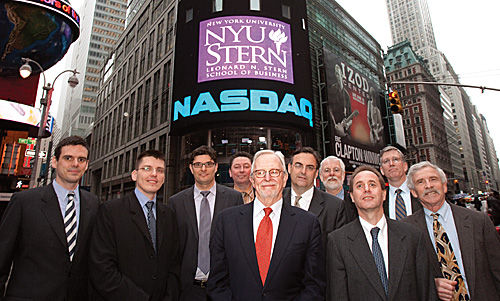
Dean Thomas Cooley and 15 co-authors of Restoring Financial Stability: How to Repair a Failed System rang the closing bell at NASDAQ on April 14. The book, published in early March, is a collaborative effort of 33 NYU Stern professors to provide an in-depth analysis of and specific policy recommendations for solving the current financial crisis and avoiding another one. |
 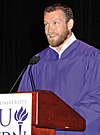 |
On May 14 at Radio City Music Hall, Raymond Odierno (left), Commanding General of Multi-National Force-Iraq and father of graduating MBA student Anthony Odierno (MBA ’09), delivered the keynote address to students receiving advanced degrees at Stern’s Graduate Convocation ceremony. Alumnus Thor Bjorgolfsson (BS ’91) (right), an Icelandic entrepreneur, delivered the keynote address at the Undergraduate Baccalaureate ceremony held for Stern’s undergraduate business college later that afternoon. General Odierno spoke about leadership and service to the community and country and the value of serving higher goals, and Bjorgolfsson spoke about the need for staying positive and opportunistic in bleak economic times and for looking for the silver lining.
New York University officially conferred its degrees during an All-University Commencement ceremony at Yankee Stadium on May 13, where Secretary of State Hillary Rodham Clinton delivered the major address. |
NYU Stern Opens New Volatility Institute
NYU Stern announced the launch of a new research center, the Volatility Institute, created under the leadership of the School’s Nobel Laureate Robert F. Engle, the Michael Armellino Professor of Finance at Stern. Engle, whose volatility research garnered the Nobel prize, introduced the Institute’s Volatility Lab, called Vlab for short, which measures and forecasts financial volatility and correlations in real time for a wide spectrum of assets, including equities, exchange rates, commodities, and bonds. The Vlab currently produces 300 analyses each day over numerous financial series using both classic models as well as some of the latest advances proposed in financial econometrics literature.
“The economic crisis has put a spotlight on the importance of calculating and managing risk effectively,” said Engle. “The forecasts coming out of our Volatility Lab will provide risk managers and regulators with alternative and independent measures to assess the state of the financial markets on an up-to-the-minute basis.” The Institute hosted its first conference for researchers and the business community on “Volatilities and Correlations in Stressed Markets” in April.
Fed’s Hoenig Criticizes Administration’s Approach to Too-Big-To-Fail Institutions
At the NYU Stern Salomon Center conference on “Bankruptcy and the Financial Crisis” in June, Kansas City Federal Reserve Bank President Thomas M. Hoenig spoke out against the government’s current stance on large financial institutions. Facing a packed room of practitioners and Stern MBA students and alumni, Hoenig offered alternate solutions for managing too-big-to-fail firms. Two expert panels included Stern Professors Edward Altman and Nouriel Roubini; William Ackman of Pershing Square Capital; Barry Adler, professor at NYU School of Law; Michael Krimminger, special policy advisor of the Federal Deposit Insurance Corporation; Gerald Rosenfeld (PhD ’73 (Heights)), deputy chairman of Rothschild North America, clinical professor, and member of Stern’s Board of Overseers; and Myron S. Scholes, chairman of Platinum Grove Asset Management.
The first panel, moderated by Stern Dean Thomas F. Cooley, discussed creditors’ rights, with the Chrysler-Fiat merger a case in point. Adler called the deal “a reorganization in the guise of a sale,” arguing that the government’s actions were inconsistent with bankruptcy laws. Altman predicted the demise of Chrysler within five years and argued that the government’s unprecedented actions in bailing out the auto industry are rewriting the bankruptcy code.
In his keynote address, Hoenig rejected the notion that some firms are too big to fail and criticized the government’s ad hoc approach. “With too-big-to-fail, capitalism is compromised and equity of opportunity is sacrificed to expediency,” he said. He laid out a three-step plan to address troubled, large institutions, namely, creating one set of “easily understood and enforceable” rules of performance for institutions with systemic importance; defining a plan of attack for firms in this category; and holding managers and stockholders of failed, large firms accountable for their actions, replacing management for the resolution process.
The second panel, moderated by Stern Finance Professor Matthew Richardson, addressed how to deal with the failure of large banks. Roubini said that receivership is the best approach to adopt with insolvent firms, because it minimizes taxpayer losses, reduces moral hazards, offers clear guidelines and protocol, and provides a faster means to divest from the institution. However, he stressed, “The most crucial criterion for deciding if you want to go through forbearance, or a bailout, is deciphering whether the institution is illiquid or insolvent.” Hoenig’s remarks and streaming videos of the event are available at: www.stern.nyu.edu/bankruptcy_conference.
A Roundtable with The Aspen Institute Addresses Financial Market Regulation
In June, NYU Stern and The Aspen Institute, with support from Ernst & Young, convened a group of 20 business practitioners, including former senior government officials, and business and law academics to discuss responses to the current economic crisis and to explore the role of financial market regulations in fostering economic recovery and growth. Among the participants were former Chairman of the SEC William Donaldson, NYU Stern Dean Thomas F. Cooley, and NYU Stern Professors William Allen, John Biggs, Bruce Buchanan, and Lawrence White.
Participants explored a number of issues that they agreed need to be resolved in order to revamp the US regulatory system, including: creating a systemic risk regulator; pricing systemic risk; addressing the destructive potential of derivatives; international cooperation in creating regulatory and corporate governance requirements; adequate resources, talent, and enforcement capacity for financial market regulators; fostering and enforcing accountability; the role and value of financial innovation; a long-term focus among corporations; and attention to the interests of long-term investors.
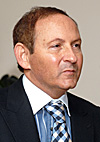 Alumnus John Demsey Discusses Managing Estée Lauder through Turbulent Times
Alumnus John Demsey Discusses Managing Estée Lauder through Turbulent Times
In February, the NYU Stern Dean’s Executive Board hosted a select group of alumni and students for cocktails and conversation at an After Market Hours event – part of a series highlighting successful Stern alumni – that featured alumnus John Demsey (MBA ’82), group president of The Estée Lauder Companies. At the NYU President’s Penthouse, Demsey spoke candidly about the event’s theme, “Managing through Turbulent Times.”
Demsey said the economy in 1982, when he graduated from Stern, was very similar to today’s. “There were very few jobs. I took a job at Macy’s that I probably wouldn’t have taken in fatter times. But there I met some of the most talented and influential people of my career.” He added, “It doesn’t matter where you start; it’s where you end up.”
Demsey worked also at Bloomingdale’s, Saks, Benetton, and Revlon before joining Estée Lauder in 1991 as West Coast vice president of sales. At the time, the firm was a privately held, family company that relied on five large, powerful brands. Today, Estée Lauder is a publicly traded, multinational organization with 29 brands and operations in 135 countries. In 1998, he steered the acquisition of MAC and was subsequently put in charge of the brand. “That’s when I really learned how to run and brand a business,” he said.
Demsey described how the world is now more monolithic, the consumer base more fragmented, and retail more vertically integrated. “Brand loyalty today means that consumers are loyal to four or five cosmetics brands,” he explained. “The average woman uses 13 cosmetics brands.”
Rather than competing on price as a long-term strategy, he said, Estée Lauder is reframing its value proposition. Quality and longevity are key, as is establishing emotional connections with consumers. Consumers are returning to brands they trust because they are not as willing to experiment, and he predicted this will work to Estée Lauder’s benefit because it has a long tradition of trusted brands. At the same time, he asserted that innovation remains critical.
Nobel Laureate Robert Lucas and Dean Thomas F. Cooley Debate
the Global Financial Crisis at Japan-US Center Event
Robert Lucas, Nobel Laureate and Shinsei Visiting Professor at NYU Stern, recently compared the global financial crisis to the Great Depression and Japan’s “lost decade” at an event hosted by the Center for Japan-US Business and Economic Studies in April. Lucas was joined by Dean Thomas F. Cooley for an informal conversation.
Referring to the economic contraction from 1929 to 1933, Lucas argued that the Hoover and Roosevelt administrations should have increased the money supply to prevent deflation and increased spending, and by not doing so, prolonged the Depression. Japan, he said, experienced prolonged deflation during the 1990s, though not as severe as the US’s Great Depression.
Lucas noted that today, unlike in 1933, there haven’t been commercial bank runs, flight to currency, or deposits lost. Still, the collapse of Lehman Brothers and other investment banks echoed that era. The Obama administration is putting more reserves into the system and also acting as a lender of last resort, something the government should have done in the 1930s, he asserted. The monetary policies taken by the current administration are good central banking policies, he said.
Dean Cooley, less optimistic, said that the policy has shifted the risk to the taxpayers and has gradually undermined the soundness of the FDIC. He explained that a time-consistent policy is one that will be sustained over a long period of time even as circumstances change, and pointed out the time-consistency challenge the government faces in continuing to alter policy as circumstances change.
Board Monitoring of Risk Management at Center of NYU Directors’ Institute
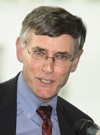 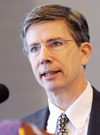
Richard Ketchum (left) and Joseph F. Tracy spoke about financial reform and the US economic outlook, respectively, at the Directors’ Institute in May. |
The NYU Pollack Center for Law & Business, a joint initiative between NYU Stern and NYU School of Law, in May hosted its seventh annual Directors’ Institute, entitled “Board Monitoring of Risk Management.” Created to help directors stay current on their legal, fiduciary, and ethical responsibilities, the Directors’ Institute was attended by more than 50 experts and practitioners in the fields of law, business, and regulation.
William R. Berkley (BS ’66), chairman and CEO of insurance company W.R. Berkley Corp. and chairman of NYU Stern Board of Overseers, opened the conference with remarks about board risks from an insurer’s perspective. The current economic crisis has brought a new level of volatility, and, for him personally, a heightened awareness of the risk of correlation. He argued that to deal with risk, managers need common sense, expertise, and critical eyes, in addition to mathematical theory, and suggested the following guidelines: Make managers risk-conscious; have boards define companies’ risk tolerance; determine how to measure risk; and have board members set parameters for keeping them informed.
Joseph S. Tracy, executive vice president and director of research at the Federal Reserve Bank of New York, predicted that the current economic downturn is likely to be the longest and deepest since the 1930s. He said production and employment continued to decline rapidly through March as the economy worked through an unusually large inventory correction, though inflation continues to slow. While nominal income growth is declining, real income growth is increasing, boosted by drops in energy prices and taxes. He noted that the personal savings rate is up but that a lot of savings are being used to reduce debt. Net worth has declined dramatically, and there remains excess inventory in the housing market. Overall, however, he argued that fiscal and monetary policy is working.
The luncheon keynote address was delivered by Richard Ketchum, chairman and CEO of the new FINRA – Financial Industry Regulatory Authority – who spoke about financial reform legislation in the US and abroad. He argued that the present financial turmoil creates opportunities and suggested that regulators address the lack of transparency with over-the-counter derivatives, improve surveillance of the equity markets, create legislation that establishes a clear set of principles, develop one oversight body of investment advisors and broker/dealers, and resolve turf issues.
The conference also featured panels that examined the board’s role in monitoring risk management, what every director should know about asset-backed securities and credit default swaps, risk embedded in succession planning and CEO compensation, and legal compliance risks in a crisis. It included expert panelists from the US Securities and Exchange Commission, the Delaware Court of Chancery, and NYU Pollack Center for Law and Business, among others.
CeDER Holds Workshop on Managing Data Risk
In April, NYU Stern’s Center for Digital Economy Research (CeDER) and IBM Research hosted a workshop to bring together leading practitioners and academics to address strategies and tactics that organizations can use to manage or reduce data risk. The conference was attended by participants from top companies and universities, including AT&T Labs, Ernst & Young, IBM, JPMorgan Chase, Thomson-Reuters, and Yahoo!, and Carnegie-Mellon University, Columbia University, and NYU Stern.
The workshop’s co-organizer, Vasant Dhar, professor of information systems and director of CeDER, said: “Organizations are collecting massive amounts of data in order to make better decisions. Data are typically viewed as an asset. However, experience reveals risks ranging from high-profile losses in reputational equity due to data breaches to suboptimal day-to-day decisions due to erroneous or incomplete data.”
The program consisted of a keynote address, seven lectures by industry experts, and a panel discussion on best practices and existing gaps for managing data risk.
 As part of Stern’s Berkley Center for Entrepreneurship & Innovation Himelberg Speaker Series, Facebook co-founder Chris Hughes addressed a select group of entrepreneurs from Stern’s student, faculty, and alumni communities. Hughes, now entrepreneur-in-residence for a venture capital fund, also met one-on-one with nine pre-selected semifinalist teams from Stern’s Annual Entrepreneurs Challenge to offer feedback on their venture ideas and explore investment opportunities. As part of Stern’s Berkley Center for Entrepreneurship & Innovation Himelberg Speaker Series, Facebook co-founder Chris Hughes addressed a select group of entrepreneurs from Stern’s student, faculty, and alumni communities. Hughes, now entrepreneur-in-residence for a venture capital fund, also met one-on-one with nine pre-selected semifinalist teams from Stern’s Annual Entrepreneurs Challenge to offer feedback on their venture ideas and explore investment opportunities. |
Practitioners, Academics, and Researchers Discuss the Future of Securities Litigation

Roundtable participants (from left to right) Brian Cartwright, Baruch Lev, Elaine Buckberg, and Seymour Jones discussed how the economic crisis may affect securities litigation. |
“History shows us that economic and financial upheavals expose accounting scandals, executive compensation excesses, and audit failures. But the current crisis seems to be an exception. Is it?” asked Stern Professor of Accounting and Finance Baruch Lev at a recent roundtable discussion at NYU Stern.
In cooperation with the National Economic Research Association (NERA) Economic Consulting, the NYU Stern Vincent C. Ross Institute of Accounting Research hosted a roundtable entitled, “Securities Litigation: Will the Current Crisis Reverse the Recent Downward Trend?”
Co-host Elaine Buckberg of NERA Economic Consulting introduced the roundtable presenters, who shared their perspectives on litigation and regulation.
Stephanie Plancich, senior consultant of NERA Economic Consulting, examined recent trends in securities class actions and highlighted a large dip in the number of federal filings in 2006. Attendees questioned whether this dip was due, in part, to the success of the Sarbanes-Oxley Act of 2002 (SOX), which aimed to increase ethics in the corporate world.
“Will the current economic downturn provide a defense for wrongdoers?” asked Stuart Grant, founding partner of Grant & Eisenhofer, a national litigation boutique firm that concentrates on corporate governance and securities litigation and other complex class actions. He also questioned whether, as numerous banks vanish from the scene, defendants will be around long enough for anyone to sue them.
Jamie Levitt, partner at the law firm Morrison & Foerster, argued that litigation stemming from the crisis has occurred in waves – the first hitting the mortgage industry, followed by the financial industry, the ripple effect, and the Madoff litigation, and next up will be the bailout lawsuits.
Stern Assistant Professor of Accounting Mary Billings shared some recent studies examining the factors that influence the likelihood of litigation.
Jan Larsen, consultant at NERA Economic Consulting, looked at recent trends in SEC settlements. Post SOX, his data showed that the top 10 settlements ranged from $250 million to $800 million.
Adding a regulatory perspective, David Weintraub, senior vice president and associate general counsel of JPMorgan Chase, predicted that while the US has experienced a heightened regulatory environment for the last six years, the rate of response to issues from state regulators will speed up, with more focus placed on hedge funds and less on broker-dealers. He also forecasted increased scrutiny of executive compensation in the financial services industry and the regulation of credit default swaps.
Drawing on his experience as the general counsel for the SEC, Brian Cartwright posed several intriguing questions: How high will filings go? Will a volatility defense work? Will a once-in-a-lifetime defense work? What about the vanishing defendant? What about situations where the defendant is at risk of being nationalized?
Clinical Professor of Accounting Seymour Jones said, in closing: “The subprime mortgage crisis spread all over the world because other countries copied the US. The more stupid things we do, the more stupid things we will pay for.”
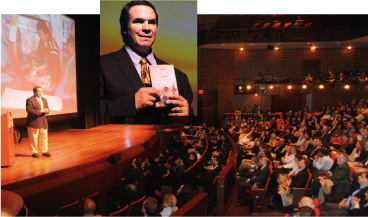
Three Cups of Tea author Greg Mortenson spoke about his book to Stern students and alumni in August. |
Greg Mortenson Delivers 2009 Ashok C. Sani Scholar-in-Residence Lecture
In March, more than 600 alumni and guests gathered to hear Greg Mortenson deliver the 2009 Ashok C. Sani Scholar-in-Residence lecture, “Promoting Peace through Education.” Mortenson is the founder of the Central Asia Institute and Pennies for Peace, nonprofit organizations dedicated to promoting education in rural communities in Pakistan and Afghanistan, and is the co-author of The New York Times bestseller, Three Cups of Tea, which was also Time’s “Asia Book of the Year.”
Mortenson has dedicated a large portion of his life to promoting education in remote and often volatile regions of Pakistan and Afghanistan. He has established more than 78 schools, providing education to more than 28,000 children, including 18,000 girls. His work, however, has not been without extreme difficulty – he has survived a kidnapping, firefights between Afghan warlords, two fatwahs, and a CIA investigation. As recognition for his work in support of global education and literacy, Mortenson will soon receive Pakistan’s highest civil award, Sitara-e-Pakistan (Star of Pakistan).
The 2009 Ashok C. Sani Distinguished Scholar-in-Residence Lecture is an annual lecture made possible through the generosity of the family of the late Ashok C. Sani (BS ’74), a successful entrepreneur, president of C.G.S. Industries Inc., a loyal supporter of NYU, and a founding member of the NYU Stern Alumni Council. The Ashok C. Sani Distinguished Scholar-in-Residence Program shares with the NYU community his interest in ethics, truth, love, peace, non-violence, compassion, and the moral and social responsibilities of members of society.


![]()